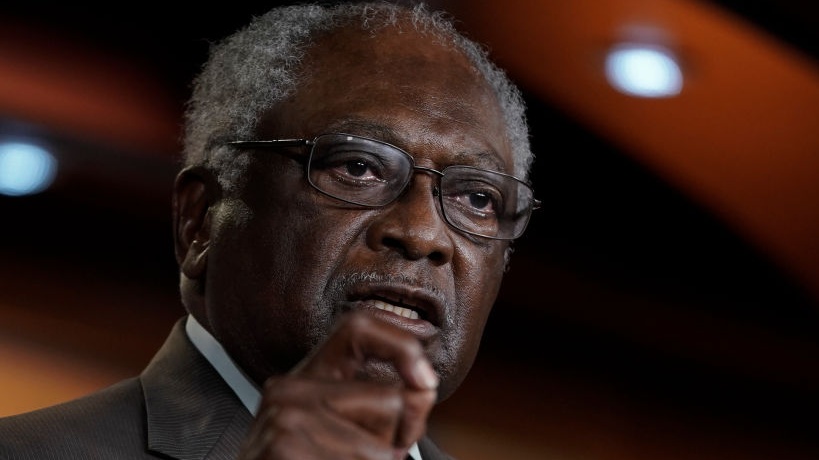Rep. James Clyburn is introducing a bill to designate "Lift Ev'ry Voice and Sing" as the official national hymn, alongside the "The Star-Spangled Banner."
"To make it a national hymn, I think, would be an act of bringing the country together. It would say to people, 'You aren't singing a separate national anthem, you are singing the country's national hymn,'" Clyburn told USA Today. "The gesture itself would be an act of healing. Everybody can identify with that song."
To make ‘Lift Every Voice and Sing’ a national hymn, would be an act of bringing the country together.
The gesture itself would be an act of healing.
Everybody can identify with that song. https://t.co/7LvE8eYadU
— James E. Clyburn (@WhipClyburn) January 12, 2021
The South Carolina Democrat plans to introduce the measure this week in hopes of healing the country's centuries of racial turmoil, which has come to a boiling point in recent months amid ongoing cases of police brutality and nationwide Black Lives Matter protests demanding justice.
Clyburn, who is the highest-ranking Black lawmaker in Congress, said he has considered the measure for years. The House Democratic Whip decided to revisit the idea during the recent period of racial tension.
“Ever since I've been in the Congress, I've been trying to come up with enough nerve to introduce a national hymn,” Clyburn said this month during a private discussion for journalists of color. “I hope I can survive and see it passed.”
"Lift Ev'ry Voice and Sing," known as the Black National Anthem, was written as a poem by James Weldon Johnson in 1899. Johnson's brother, John, then transformed the poem into music. School children first performed the song in public at a birthday celebration honoring President Abraham Lincoln. Since then, the anthem has been performed at awards programs, graduations, church services and many more Black events.
The lyrics serve as a reminder of the struggles Black Americans have endured through the years but also to deliver a message of hope.
“This song speaks to the people who suffered through the chastening rod,” said Howard Robinson, an archivist at Alabama State University. “I think that the song is a different look at America, is a more critical look at America while at the same time being optimistic about our present and future.”
Michael Fauntroy, a political scientist at Howard University, said the song portrays a symbolic victory, but that doesn't necessarily translate to structural transformation.
“It’s symbolically notable for Black people, but in the larger scheme of things, this isn’t going to put food on people’s table, it’s not going to increase people’s pay,” Fauntroy said.
But Clyburn said it's not only about the symbolism, but also about the deeper meaning of the song, which he describes as "a very popular song that is steeped in the history of the country.”
The NFL, which found itself at the center of controversy after Colin Kaepernick started kneeling during the national anthem, played "Lift Ev'ry Voice and Sing" and "The Star-Spangled Banner" before the first week of games last year.
Kaepernick, along with other activists, has criticized "The Star-Spangled Banner" for its often-omitted third stanza, which glorifies slavery, NBC News reported.
Nolan Williams, a composer and cultural curator said the country should come together to embrace "Lift Ev'ry Voice and Sing."
“It really should become a piece that we as a nation recognize and honor for what it means, not just for African Americans, but for Americans,” Williams said. “The plight of African Americans is a central part of American history.”
In regards to Clyburn's resolution, Williams said the lawmaker may be trying to push the country "to have yet another inconvenient conversation about a subject matter that is just so hard for us to grapple with.”
Reiland Rabaka, author of Civil Rights Music: The Soundtracks of the Civil Rights Movement, said "Lift Ev'ry Voice and Sing" is symbolic of the New Negro Movement, a term coined during the Harlem Renaissance.
"This so-called New Negro is going to be representing that first generation of African Americans to come of age in American society that are not in bondage," Rabaka said, according to MSN. "So they sort of come into the 20th century with this new optimism — that they're going to be able to really have access to American democracy."
